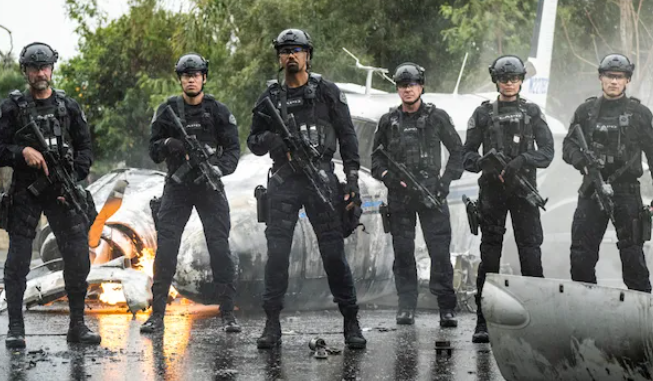
Introduction: A Timely Commitment from S.W.A.T.
In the wake of George Floyd’s tragic death and the global protests it sparked, CBS’ S.W.A.T. made a profound commitment to tackle the complex issues of race and policing. Executive producers Aaron Rahsaan Thomas and Shawn Ryan vowed to use their platform to explore these themes with renewed vigor, promising, “[We are] frustrated, angry, but determined to do better. On-screen and off.”
This bold pledge comes at a time when the spotlight on police misconduct and systemic inequality has never been brighter. Let’s dive into how S.W.A.T. plans to address these challenges and what it means for viewers and society.
A Show Rooted in Reality
From its debut in 2017, S.W.A.T. has aimed to depict the intersection of law enforcement and minority communities. Through the lens of Daniel ‘Hondo’ Harrelson, played by Shemar Moore, the series has offered a nuanced look at the duality of being both Black and a police officer.
Why Now? The Impact of George Floyd’s Death
George Floyd’s death in 2020 marked a turning point in the global conversation about race and policing. For S.W.A.T., it was a moment of reckoning. The writing team released a heartfelt statement, acknowledging the need to delve deeper into the systemic issues that plague our society.
How S.W.A.T. Plans to ‘Do Better’
Amplifying Minority Voices in the Writers’ Room
Diversity behind the scenes is crucial for authentic storytelling. S.W.A.T. has pledged to involve more minority voices in crafting scripts that resonate with real-world experiences.
Exploring Hondo’s Dual Identity
As a Black officer, Hondo’s character embodies the conflict many feel when straddling two worlds. Season 4 promises to delve into his personal struggles and the broader implications for his team and community.
Revisiting Historical Moments
The postponed flashback episode focusing on the 1992 L.A. riots will now air early in Season 4. This episode juxtaposes past and present struggles, offering viewers a stark reminder of how history continues to repeat itself.
Addressing Systemic Issues On-Screen
Challenging Stereotypes in Law Enforcement
S.W.A.T. aims to challenge the “good cop” trope by portraying officers as multifaceted individuals capable of mistakes and growth. This honest depiction fosters meaningful conversations about accountability.
Highlighting Community Engagement
The show emphasizes the importance of community policing, illustrating how trust and mutual respect can lead to safer neighborhoods.
Tackling Police Misconduct
Episodes will address instances of police misconduct, encouraging viewers to confront uncomfortable truths about systemic corruption.
Viewer Impact and Responsibility
Encouraging Dialogue
S.W.A.T.’s dedication to these issues is more than entertainment—it’s a call to action. By sparking conversations, the show empowers viewers to advocate for change in their own communities.
Inspiring Empathy Through Storytelling
The power of storytelling lies in its ability to foster understanding. By humanizing complex issues, S.W.A.T. encourages empathy for those affected by systemic inequality.
Conclusion: A Step Toward Progress
S.W.A.T.’s commitment to exploring race and policing reflects a broader societal shift toward accountability and equity. While television alone cannot solve systemic issues, it can inspire change by shedding light on truths that demand action.
As viewers, we hold the power to demand and support content that addresses real-world challenges. S.W.A.T. is answering that call, one episode at a time.
FAQs
Q1: When will S.W.A.T. Season 4 premiere?
Season 4 is set to premiere in early 2021.
Q2: How does S.W.A.T. plan to address race and policing?
The show will incorporate authentic storytelling, focusing on systemic issues and community engagement.
Q3: Will the postponed L.A. riots episode air?
Yes, it will feature early in Season 4, drawing parallels between past and present events.
Q4: How can viewers support S.W.A.T.’s message?
Engage in discussions sparked by the show and advocate for systemic change in your community.
Q5: What makes S.W.A.T.’s approach unique?
Its dedication to authenticity and nuanced storytelling sets it apart, providing a balanced perspective on complex issues.